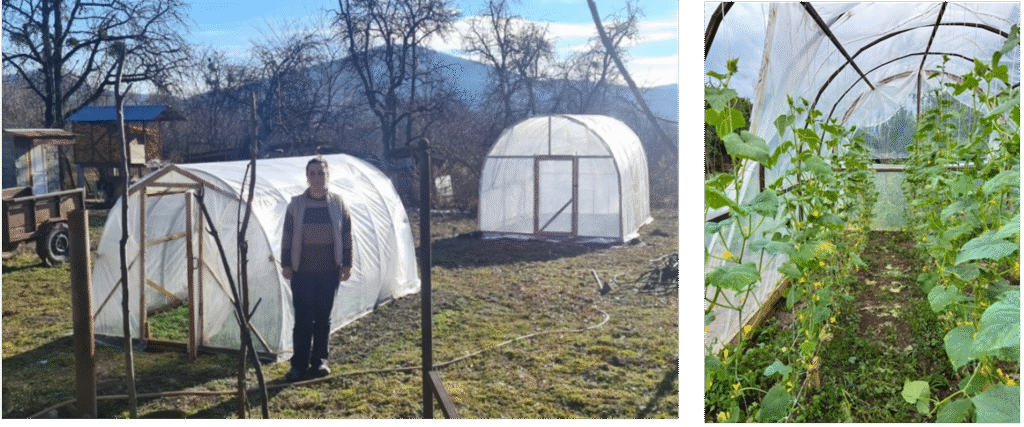
The Problem and Motivation Behind
“In the village, it’s really difficult to start something and sell it at a fair price. I didn’t want to leave—I wanted to stay and build something that had value.” – Tamar.
Tamar Gozalishvili (30-year-old) is a trained nurse by profession. After getting married, she left her full time job and moved with her husband to a rural village near Akhmeta in eastern Georgia. She was willing to build a meaningful life in the village. However, she soon realised that while village life offered peace, it lacked opportunities—especially for women.
Tamar noticed many families in the village grow vegetables and herbs, yet struggle to sell them at reasonable prices. Also, women were often limited to household roles and rarely encouraged to earn an income or pursue personal growth. In contrast, she wanted to start her own business—something that would help her feel more connected to village life while creating opportunities for herself and others.
The Innovative Solution
With support from the Youth Innovation Lab, Tamar developed a business plan and launched a greenhouse to grow fresh vegetables and herbs year-round. She also installed a drip irrigation system to ensure water was used sustainably. Instead of relying only on local sales, she used social media to share her journey and connect with potential buyers. Her blog became both a storytelling platform and a marketplace. Interest from customers in Tbilisi grew quickly, and Tamar began delivering her greens directly to the capital, selling them at fair prices and building a loyal customer base.
“I started a blog showing my greenhouse work and daily life. People loved it. Even before I offered, they asked me to bring the greens to Tbilisi [the capital city of Georgia]…Now every week I go to Tbilisi, and every week I develop more. People really appreciate having fresh village products.” – Tamar.
The innovation wasn’t just the greenhouse—it was in the way Tamar connected rural produce with urban demand through storytelling, personal branding, and digital outreach. She adapted her approach based on customer feedback and scaled up her production. Every week, she travelled to Tbilisi, and with every trip, her motivation and earnings grew.
Lessons Learned and Addressing Challenges
“At first, I was scared. I didn’t know how to register a business or do taxes. But the mentors helped me step by step, and now I’m proud I did it.” – Tamar.
The Youth Innovation Lab (YIL) provided Tamar with a seed grant, training, and mentorship that helped her set up the greenhouse and develop a solid business plan. However, her journey was not without challenges. One of the first hurdles she faced was registering her business—something entirely new to her. The tax procedures, declarations, and legal requirements felt overwhelming at the beginning. But with the support of YIL mentors, especially on taxation and registration processes, Tamar learned how to navigate the system with confidence.
Reflecting on her experience, Tamar identified two lessons learned:
- Overcoming social doubt through persistence: In the early stages, Tamar faced a lot of scepticism from those around her. “Everyone around me said, ‘Why are you going to these trainings? No one’s going to give you a grant.’ Even my own family didn’t believe it at first,” she recalled. But Tamar stayed committed. After receiving the seed grant, she launched her greenhouse and began earning a steady income. Slowly, the same people who doubted her started coming to her for advice. “Now I tell everyone—having your own income changes everything. It gives you courage, independence, and the ability to make your own decisions,” Tamar added.
- Inspiring other women to start their own business: Tamar journey showed that it’s possible to start a business, even in a small rural community. “Women saw me attending sessions, receiving a grant, starting my greenhouse—and they wanted to do it too,” she shared. Her success encouraged two women to join the Youth Innovation Lab themselves. “Even those who didn’t get a grant wanted to learn and grow,” Tamar added.
Next Steps and Future Aspirations
“We shouldn’t only think about ourselves. It’s important to inspire each other, develop together, and make village life better.” – Tamar.
Tamar is planning to expand her greenhouse, introduce new products, and grow her customer base. Her vision includes selling directly to companies, especially around holidays like New Year’s when demand spikes for fresh, high-quality herbs. She also wants to create more visibility for village-based businesses and contribute to reshaping perceptions around women’s roles in rural communities. Additionally, she plans to organise more community-based activities, offer peer-to-peer learning opportunities, and continue influencing women to step into leadership roles in their households and villages.
“Women are becoming more active in community decisions. I’m so happy to see that. We can change our families, our villages, and even our region—together.” – Tamar.